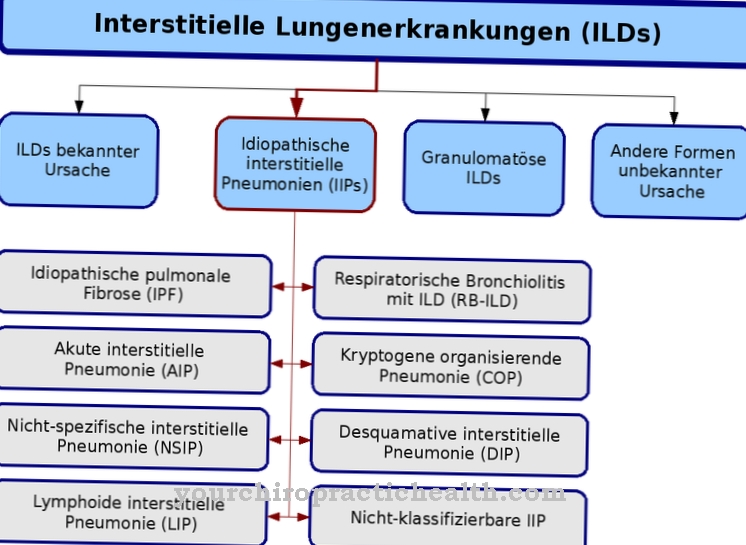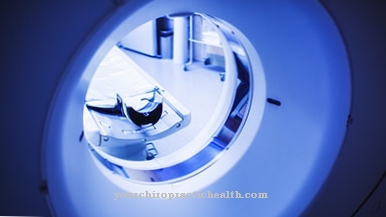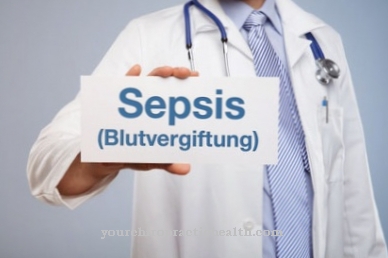From Wolff-Parkinson-White Syndrome (short: WPW syndrome) Affected people suffer from a usually non-life-threatening heart defect. An additional conduction path for the electrical impulses controlling the heart function leads to a racing heart. Tachycardias in young adults are often a sign of Wolff-Parkinson-White syndrome.
What is Wolff-Parkinson-White Syndrome?
At the Wolff-Parkinson-White Syndrome the disruption of the heart rate is caused by an additional pathway for the electrical impulses. It is a congenital heart defect that mostly only shows up in those affected between the ages of 20 and 30. Much earlier occurrence in children or much later in advanced adulthood is also possible.
The Wolff-Parkinson-White syndrome manifests itself as a sudden, strong increase in heartbeats. Tachycardia develops, which sometimes lasts only a few minutes, in severe cases it can last for several hours. Wolff-Parkinson-White syndrome is usually not life-threatening.
causes
By the Wolff-Parkinson-White Syndrome the normal contraction of the heart is disturbed. It is controlled by an excitation conductor system. In these heart muscle cells, electrical impulses are generated that cause the heart to contract or relax. These impulses are transmitted exclusively via the AV node.
In the case of Wolff-Parkinson-White syndrome, there is a supplement to this normal excitation conductor system. The impulses only propagate through the AV node, but they find one or seldom several additional conductors. This causes the impulses to cycle between the atria and the ventricles. The heartbeat accelerates without any notice.
It can reach a frequency that is hazardous to health, although it does not necessarily occur in Wolff-Parkinson-White syndrome. Rather, it comes to feelings of tightness, drowsiness or the fearful feelings often associated with a racing heart. As quickly as the increased beat occurs, it also stops suddenly in Wolff-Parkinson-White syndrome.
Symptoms, ailments & signs
Wolff-Parkinson-White syndrome does not always have symptoms and sometimes changes are only detected by an electrocardiogram. One of the most common symptoms is rapid heartbeat, which occurs suddenly. The heart can then beat up to 240 times per minute, but the pulse is very regular. The racing heart is experienced by some patients as excessive heartbeat, which is known in medicine as "palpitation".
Others feel a "heart stumbling". In addition, many people suffer from shortness of breath, chest pain and dizziness. After a racing heart, many complain of fatigue and a pronounced need to urinate. In many patients, the racing heart (tachycardia) also triggers anxiety, which is exacerbated by shortness of breath and dizziness.
Sometimes the heart is unable to pump enough blood to the organs due to the increased heart rate, so that some people may lose consciousness. WPW syndrome symptoms are rather rare in infancy. When a baby develops tachycardia, he or she breathes quickly and is very pale. He may also refuse to drink or eat and is easily irritable. Because the structure of the heart in children is not yet fully developed, Wolff-Parkinson-White syndrome can be more dangerous than in adults.
Diagnosis & course
Come in Wolff-Parkinson-White Syndrome indicating tachycardias, the attending physician will order an EKG. If there are deviations, a long-term ECG is required in the next step in order to monitor the heart's activity over a longer period of time.
In some cases, with Wolff-Parkinson-White syndrome, a cardiac catheterization exam is also done to determine the exact location of the extra conductor called the Kent bundle. Wolff-Parkinson-White syndrome usually proceeds without any further impairment to the person concerned. Palpitations are uncomfortable but rarely life-threatening.
In severe cases, those affected tire more quickly than healthy people and tend to faint or dizzy spells. In individual cases, however, it can coincide with other heart diseases and trigger ventricular fibrillation up to cardiac death. Children who already show symptoms of Wolff-Parkinson-White syndrome often suffer from anorexia, have difficulty concentrating, and developmental delays can occur.
Complications
Wolff-Parkinson-White syndrome is a serious condition that needs to be treated by a doctor. Self-healing does not occur and in the worst case those affected can die of a heart defect. As a rule, Wolff-Parkinson-White syndrome leads to disorders of the heart rhythm.
The patients cannot perform strenuous activities or sports and are therefore significantly restricted in their everyday life. Palpitations are also common and can lead to sweating or a panic attack. In many cases, those affected also suffer from shortness of breath and thus from dizziness or vomiting.
Furthermore, anxiety or confusion often occurs.Patients may also lose consciousness if they have severe breathlessness. Treatment of Wolff-Parkinson-White syndrome is carried out through surgery. There are no particular complications.
However, those affected are dependent on taking medication even after the procedure. In emergencies, treatment must be carried out by an emergency doctor. The life expectancy of the patient is also significantly reduced and restricted by the Wolff-Parkinson-White syndrome.
When should you go to the doctor?
Visiting a doctor is mandatory the first time Wolff-Parkinson-White syndrome occurs. Anyone who experiences a sudden palpitations of the heart for the first time during exercise or at rest is unsettled. If the racing heart is not due to panic, fear, stress, haste or other explainable impulses, a visit to the doctor must be arranged immediately. It is probably a special form of cardiac arrhythmia.
The WPW syndrome is a inherent atrioventricular reentry tachycardia. It requires treatment - especially if atrial fibrillation is present at the same time. Then Wolff-Parkinson-White syndrome is life-threatening because ventricular fibrillation can lead to cardiac arrest. The doctor uses an electrocardiogram to determine whether the sudden palpitations have an organic cause or not.
In the case of Wolff-Parkinson-White syndrome, superfluous stimulus conductors to the heart are the cause of the racing heart. Since the attacks of palpitations occur more frequently in Wolff-Parkinson-White syndrome, the attending physician usually arranges a long-term ECG. This is particularly meaningful if it can record an attack of palpitations. The problem is that the treatment of Wolff-Parkinson-White syndrome is different from the treatment of other heart diseases. Certain heart medications like digitalis or verapamil are not suitable for Wolff-Parkinson-White syndrome.
Instead, the sclerotherapy of the triggering, but superfluous, conduction pathways to the heart by catheter ablation is usually successful. This catheter-supported procedure on the left atrial side is associated with only minor surgical risks. It usually creates permanent relief.
Treatment & Therapy
The Wolff-Parkinson-White Syndrome is not always in need of treatment. In many cases it is only diagnosed by chance, as those affected are symptom-free. In other cases, patients learn what are known as vagus maneuvers, which consist of movements, swallowing cold drinks, or other actions that stimulate the vagus nerve and restore the heartbeat to normal.
In addition to these simple methods, there is the possibility of drug treatment for Wolff-Parkinson-White syndrome. Heart medication that is suitable for interrupting the tachycardia is available in tablet form or as injections. They are usually taken when symptoms show up and are not a permanent medication used to treat Wolff-Parkinson-White syndrome.
A defibrillator is used in the event of a particularly severe attack of palpitations. The impulse circuit is interrupted by the current surge and the heartbeat returns to normal. If the exact position of the Kent bundle is known, there is also the possibility of correcting the anomaly of Wolff-Parkinson-White syndrome with a high success rate.
A heart catheter is used to heat the relevant muscle point in the heart with electricity to such an extent that the cells there specifically die and tachycardias triggered by Wolff-Parkinson-White syndrome can no longer arise in the first place.
You can find your medication here
➔ Medicines to strengthen the heart and circulatory systemprevention
Preventive measures are when congenital Wolff-Parkinson-White Syndrome not possible. This applies to the actual occurrence of the disease as well as to the phases of the racing heart that occur without notice. Heart health should, however, be checked regularly in the case of Wolff-Parkinson-White syndrome.
Aftercare
In most cases, the affected person has very few and limited direct follow-up measures available in Wolff-Parkinson-White syndrome. For this reason, those affected with this disease should consult a doctor at an early stage in order to prevent other possible complications and complaints. Independent healing cannot take place.
Since Wolff-Parkinson-White syndrome is a genetic disease, it can usually not be completely cured. Therefore, if you want to have children, genetic testing and counseling should always be carried out first in order to prevent the disease from recurring in the descendants. Most people with Wolff-Parkinson-White syndrome are dependent on medication.
All instructions of the doctor should be followed. The correct dosage and regular intake must also be observed. In many cases with Wolff-Parkinson-White syndrome, contact with other people affected by the disease can also be very useful, as this can lead to an exchange of information that can make everyday life easier.
You can do that yourself
Wolff-Parkinson-White syndrome patients suffer from a severe heart defect. This represents a threat to life. For this reason, cooperation with the treating doctor is extremely important. All situations of physical or emotional stress should be avoided or reduced to a minimum.
In the area of self-help, care must be taken that there is no physical overexertion and that rest phases are taken when the first symptoms set in. Obesity should be avoided, as this leads to a further severe impairment of the heart. Therefore, the daily food intake should be monitored and, if necessary, optimized. Sports activities are also only to be carried out after consulting the attending physician. Most sports cannot be performed by patients with Wolff-Parkinson-White syndrome. Therefore, leisure activities should be tailored to the health options.
Working with a psychotherapist helps to better deal with situations of emotional stress. Everyday developments and events should not lead to any cognitive problems. In the case of insomnia or circling thoughts, any discrepancies should therefore be addressed openly. Existing disputes and interpersonal misunderstandings should be resolved as quickly as possible. The promotion of the joy of life and the well-being of the further health development has proven helpful. The focus of one's own life should be directed more towards activities and situations that lead to an improvement in the quality of life.





.jpg)


















.jpg)



